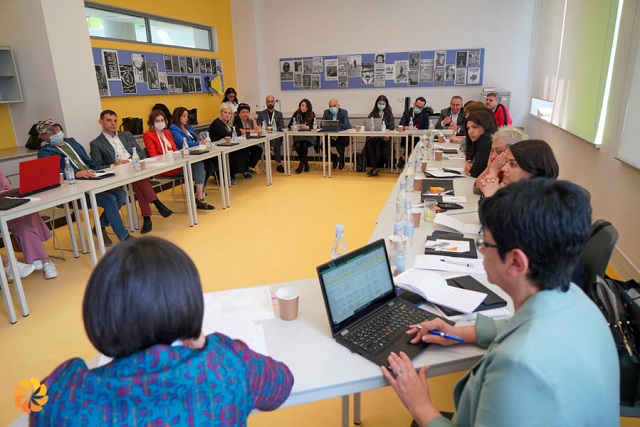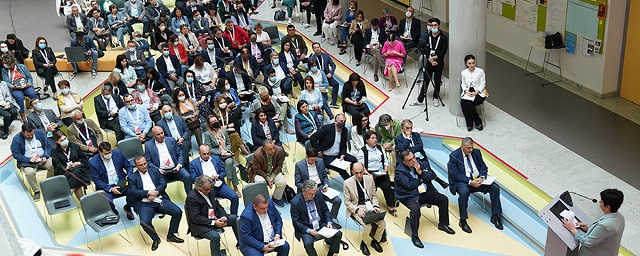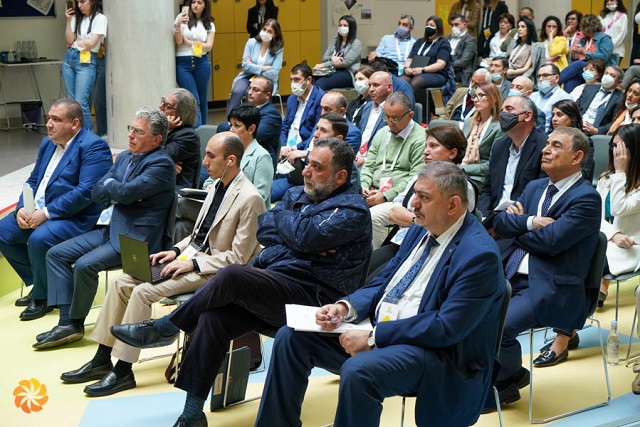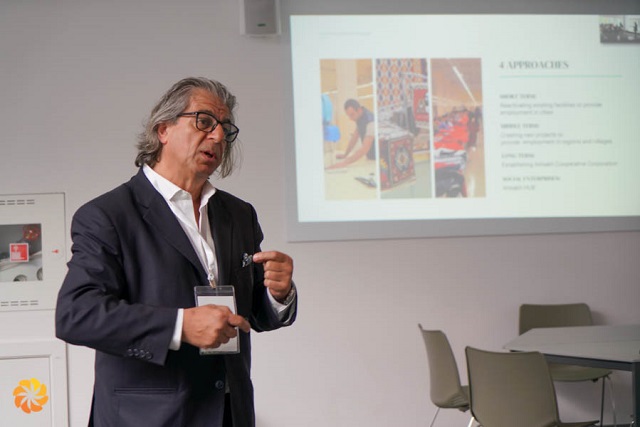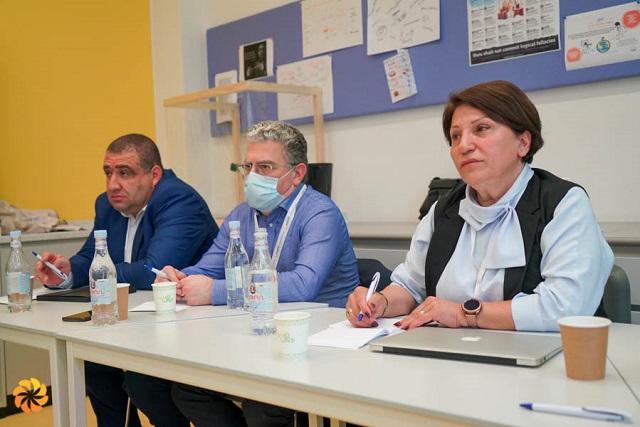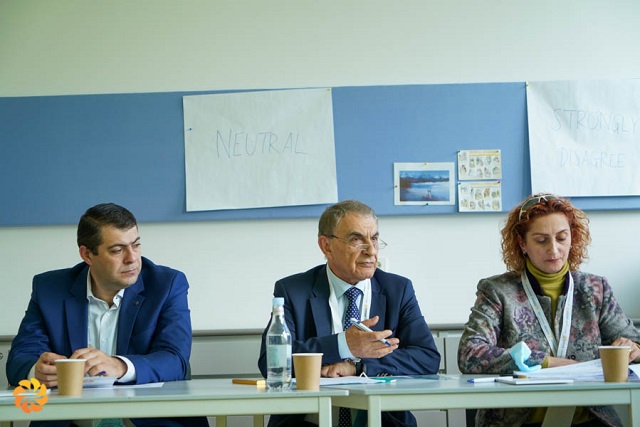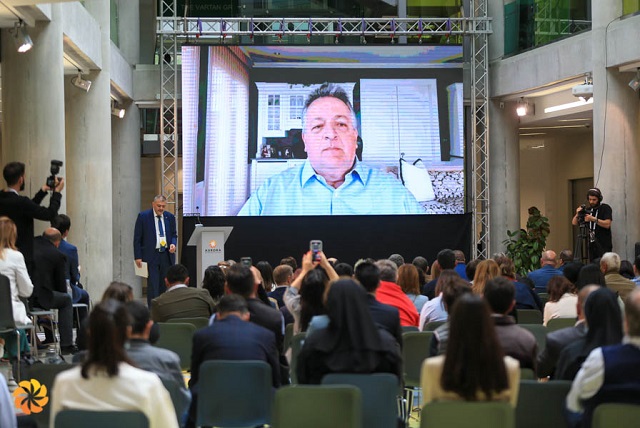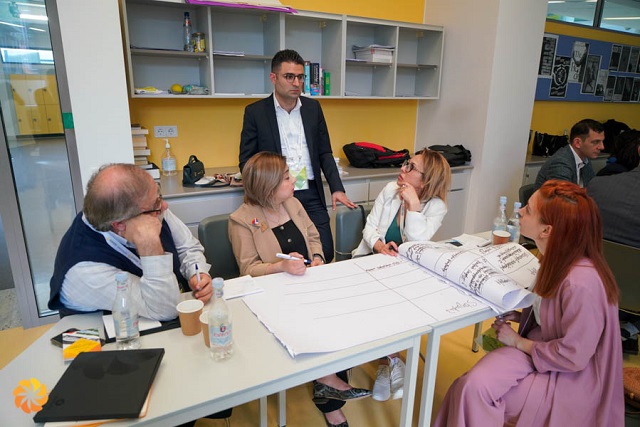Aurora Dialogues: A Common Platform to Understand Artsakh’s Needs and Specify Priorities
Not only security, social and economic issues need to be addressed to stabilize the situation in Artsakh (Nagorno Karabakh), strengthen and restore it after the 2020 war, but also a special priority should be given to human resources and high-quality specialists in Artsakh who will be involved in the restoration work on the ground – this was the conclusion made by the participants of the Aurora Dialogues event titled “Partnership for Artsakh” that was held in UWC Dilijan on May 2, 2021. The Aurora Humanitarian Initiative had brought together the partners of the Aurora for Artsakh program, local and Diaspora organizations, foundations, government agencies and mass media representatives.
Vache Gabrielyan, Dean of the Manoogian Simone College of Business and Economics at the American University of Armenia (AUA), noted that this gathering was aimed at mapping the needs and capacities to understand the scale of needed work and areas and opportunities to organize further activity.
“This is a crucial event, which also embodies Aurora’s Gratitude in Action concept, when people who receive help give a helping hand to those in need. Many people might have ideas, but not have enough funds; others might have money, but not ideas, and others can have capacities. Here, we will combine ideas and capacities. This is not merely an event but a starting point for joint work,” said Vache Gabrielyan.
Read also
Since the launch of the Aurora for Artsakh program, the Initiative has already allocated almost $1.7 million to support 75 projects implemented by local and international partners and intends to expand the program, continuing this mission.
Welcoming the participants, Ruben Vardanyan, Co-Founder of the Initiative, talked about rebuilding Artsakh and building a stronger Artsakh and Armenia by joint efforts: “Aurora’s support to Artsakh is not just about financial donations; we should become a bridge and maintain it. One side of it is us, our Armenian spirit and identity, and the other side is the way to be connected to the world. We should build a strong nation. I am sure we can.”
“‘Partnership for Artsakh’ is not only the name of this event, but it is actually the philosophy of how Aurora works. Wherever Aurora starts projects and works in the world or in Armenia and Artsakh, we do it together with partners. When the war started last year, the Aurora Co-Founders committed immediately $1 million to the All-Armenian Fund for urgent aid projects. And when the war ended, Aurora was one of the first to commit another one million for the projects, for the people affected by the war,” said Nicola Stanisch, Executive Director of the Aurora Humanitarian Initiative.
Artak Beglaryan, Chief of Staff of the President of the Artsakh Republic, said that the war caused the internal or forcible displacement of 39,000 people who were presently homeless, and that there were families of over 4,000 fallen soldiers, 10,000 wounded soldiers, missing persons, and prisoners of war, and that, in turn, brought forth issues related to mental health. He underlined the importance of the discussion to understand these issues and their solutions. “As someone from Artsakh and as a representative of the Artsakh Government, I would like to thank you for your heart that beats for that piece of our homeland, too. I am grateful to Aurora and all participants for their efforts to help Artsakh.”
“There are 6,300 families, around 25,000 people, displaced from Artsakh in Armenia. We should come together and jointly build our way back home,” added Michayel Virabyan, Coordinator of the Operational Headquarters of the Artsakh Government in Armenia.
“This platform is very important in that it gives us the opportunity to discuss the urgent, mid-term and long-term needs and to see how we can combine our capacities. We take active measures to enable international institutions to implement projects in Artsakh,” said Karen Daduryan, Advisor of Foreign Minister of Armenia, speaking about their Artsakh-related work.
The event featured four workshops focused on healthcare, education and culture, economic development, and social issues, during which specialists discussed the sector-based needs and tried to define next steps. The Workshop on Healthcare was moderated by Ara Babloyan, Scientific Director and Chairman of the Management Board of the Arabkir Joint Medical Center-Institute of Child and Adolescent Health; the Workshop on Education and Culture Workshop was moderated by Narine Aghabalyan, Head of the Aurora for Artsakh program and Former Minister of Education, Science and Sports of the Republic of Artsakh; the Workshop on Economic Development was moderated by Vahe Keushguerian, Advisor to the President of Artsakh for Development Programs and Co-founder and Chairman of the Board of Impact Hub Yerevan; and the Workshop on Social Issues was moderated by Mira Antonyan, Chair of the Armenian Association of Social Workers and Executive Director of the Children Support Center-Foundation, Fund for Armenian Relief.
During the sessions, the preliminary outcomes of a survey aimed at assessing the effects of the war in Artsakh were presented. The survey had been conducted by the Armenian Association of Social Workers․
“Our survey showed that 30% of people relocated from Artsakh to Armenia are ready to return to Artsakh right away, 40% are ready to return if there is housing and other conditions, and only 30% still hesitate. This is a very good indicator,” said Mira Antonyan. She also touched upon the discussion carried out during the Workshop on Social Issues and stressed out the importance of the local capacity development, the engagement of specialists from Armenia and the Diaspora and the preparation of specialists directly in Artsakh.
Ara Babloyan summed up the Healthcare Workshop by stressing out the issues related to the loss of professional potential and infrastructural damages caused by the war. He also highlighted the importance of joint discussions: “Aurora provided an opportunity to the main organizations that have done work in Artsakh to know each other, and to continue their work by collaborating. This is why a coordinating board, adjunct to the Ministry, was set up. On the one hand, the board will help elaborate a healthcare development strategy, and on the other side, it will help coordinate all the aid that will be provided to Artsakh, both in short-term and long-term perspectives.”
The participants of the Workshop on Economic Development and the moderator of the workshop Vahe Keushguerian had specified several areas around which discussions were carried out. Those areas were production, agriculture, social entrepreneurship, urban development, and regional administration of infrastructures. Mr. Keushguerian highlighted some of the opportunities for economic recovery and development. “For example, in terms of consumer goods industry, there are sewing factories and our priority is to restore their operations. Carpet weaving is another issue of interest to us. Carpet making has been a tradition for thousands of years, but we presently have a factory only in Stepanakert where we have 60 employees. This is almost a lost culture, which we ought to restore.”
The participants of the Workshop on Education and Culture, and the moderator of the workshop Narine Aghabalyan discussed the issue of saving from destruction the Armenian cultural heritage currently under the control of Azerbaijani Forces, and the need to make fundamental changes in the field of education, correctly match formal and non-formal education, adapt education and science to the economic needs, reinforce human capital, and so on. A detailed written record of all these discussions was made to continue further work on those topics.
“These discussions were aimed at not only mitigating or eliminating the effects of the war, but also at shaping a vision for future, which is very important. If we speak about rebuilding and strengthening Artsakh, we should by all means look to the future, and we should make the vison of that future visible to the people living there,” said Narine Aghabalyan.
Noubar Afeyan, Co-Founder of the Aurora Humanitarian Initiative, joined the “Partnership for Artsakh” event online and greeted the participants from Boston, Massachusetts. Both he and Ruben Vardanyan remembered Vartan Gregorian, Co-Founder of Aurora, who recently passed away, and quoted him in their speeches.
“We believe this event will contribute to realizing our mission more effectively in the future. As I have mentioned on various occasions, if we don’t jointly create our future today, tomorrow will be too late. It is hard to believe today that Vartan is not with us and I would like to conclude my speech by quoting him, ‘With survival comes responsibility, with responsibility comes action, not just words.’ Today we all are responsible,” said Noubar Afeyan.
* * *
About the Aurora Humanitarian Initiative
The Aurora Humanitarian Initiative is a foundation that seeks to address on-the-ground humanitarian challenges around the world with the focus on helping the most destitute. Its mission is rooted in the Armenian history as the Initiative was founded on behalf of the survivors of the Armenian Genocide and in gratitude to their saviors and strives to transform this experience into a global movement.
All Aurora’s activities are based on the universal concept of Gratitude in Action. It implies that countless people around the world who have received aid in time of crisis can best express their gratitude by offering similar assistance to someone else. By involving Aurora supporters around the world, this will become a global endeavor that will snowball to expand the circle of saviors and most importantly – the number of those saved.
Addressing urgent humanitarian challenges, the Initiative provides a second chance to those who need it the most. True to its vision – “We believe that even in the darkest times, a brighter future is in the hands of those who are committed to giving others help and hope” – Aurora welcomes all who embrace this philosophy.
This eight-year commitment (2015 to 2023, in remembrance of the eight years of the Armenian Genocide 1915-1923) aims to promote action-based philanthropy focused on tangible results. This is achieved through the Initiative’s various programs: Aurora Prize for Awakening Humanity, Aurora for Artsakh, #AraratChallenge movement, Aurora Dialogues, Aurora Grants, Aurora Community, Aurora Index, and the 100 LIVES Initiative.
The Aurora Humanitarian Initiative is the vision of philanthropists Vartan Gregorian, Noubar Afeyan and Ruben Vardanyan who have been joined by thousands of supporters and partners. Aurora’s Chair, Dr. Tom Catena, draws on his experience as a surgeon, veteran, humanitarian and the 2017 Aurora Prize laureate to spread the message of Gratitude in Action to a global audience.
The Aurora Humanitarian Initiative is represented by three organizations – the Aurora Humanitarian Initiative Foundation, Inc. (New York, USA), the 100 Lives Foundation (Geneva, Switzerland) and the Aurora Humanitarian Initiative Charitable Foundation (Yerevan, Armenia).
* * *
Aurora for Artsakh
Through the Aurora for Artsakh program, the Aurora Humanitarian Initiative helps the people of Artsakh facing a grave humanitarian crisis in the aftermath of the 2020 Artsakh (Nagorno Karabakh) war. As of March 2021, Aurora has already allocated $1,700,000 to support 75 projects in Artsakh implemented by both local and international partners and to provide urgent humanitarian assistance to the people of Artsakh through the Hayastan All Armenian Fund.
The Aurora for Artsakh program also includes bringing the world humanitarian leaders to the region to find new opportunities to help the local people, to support Artsakh’s international standing, and to ensure effective solutions on the ground.
The Aurora for Artsakh program is being implemented through the #AraratChallenge movement, a global crowdfunding initiative addressing humanitarian needs in Armenia and Armenian communities globally. This crowdfunding campaign is set to increase the impact and reach of the Aurora Humanitarian Initiative to combat poverty, improve healthcare and provide education to those in need. Anyone can join this movement and give a second chance to those who need it most.
Starting from October 2020, the funds raised through the #AraratChallenge movement have been used to support the humanitarian initiatives helping the people of Artsakh affected by the war.
To get more information about the projects supported by the Aurora for Artsakh program and to see the “Faces of Artsakh,” please visit AraratChallenge.com.
IDeA Foundation




















































